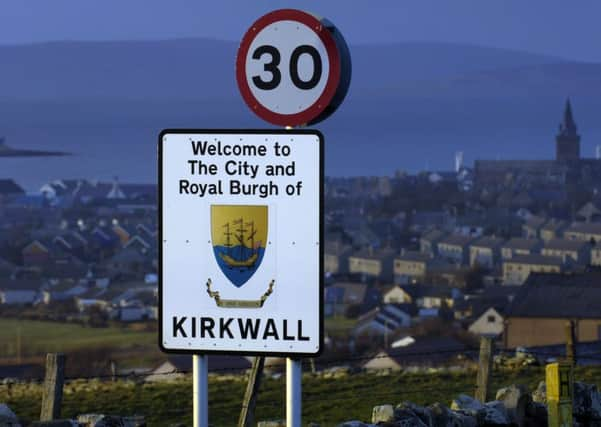Martyn McLaughlin: Islands Bill is a chance to make good some old promises


The story of how Orkney voted in last month’s local government elections has, perhaps unsurprisingly, been overshadowed by the chaos and division that passes for national politics. But the results threw up an interesting anomaly which ought to remind us of the historic disconnect between Scotland’s outlying island communities and the centres of power in Edinburgh and London, as well as posing questions about the future of that strained relationship.
In the archipelago’s East Mainland, South Ronaldsay and Burray ward, nearly a fifth of voters backed Steve Sankey, an ornithologist and wildlife tour guide as their first preference, a show of support which saw the father-of-one become not only the first Scottish Green councillor to serve on the 21 member-strong Orkney Islands Council, but the first elected official from any mainstream party political party.
Advertisement
Hide AdAdvertisement
Hide AdFurther north, there was a similar surprise, with the SNP’s Robbie McGregor winning a berth on the Shetland South ward, becoming the first councillor to represent the party on the council.
Anyone familiar with Scottish island life will not be overly surprised at the absence of the big political beasts from the grassroots. Across the country, an independent streak runs through local government, with around one in six councillors not affiliated to any party; in our northernmost communities, detachment from the party apparatus is the rule, not the exception.
Stop off at Kirkwall’s Lynnfield Hotel, for example, and one particular exhibit on the howf’s walls demands closer attention. Written in Visigothic script on what appears to be laminated card, the Declaration of Wyre is a curious creation: a modern response to a centuries old perceived injustice.
Addressed to the royal households of Norway and Denmark, it beseeches them to “confer and consult on our constitutional status, reaffirm our strong historical ties with Norway and Denmark, and request the British government, until such time as our constitutional status is resolved, to honour the guarantees made at the impignoration and subsequently to safeguard our laws, rights and traditions.”
The splendidly florid plea, referencing the 15th century dowry which saw the Scandinavians cede control of Orkney and Shetland, was made at a time when the expansion of Dounreay led many in Orkney to protest against Westminster’s apparent indifference to their concerns. The declaration, written by John Goodlad and Margaret Flaws, was a droll means of imparting a serious message.
More than three decades on, political disenfranchisement remains a bugbear. While Holyrood has benefited Scotland’s rural swathes, new powers have proved inexact; the Road Equivalent Tariff has helped the Western Isles while leaving those off Scotland’s northern coastline increasingly aggrieved. Similarly, Police Scotland’s central belt-approach is an ill fit for island communities everywhere. There is a frustration that devolution is seen as an accomplishment rather than an ongoing process.
Having long simmered below the surface, the repercussions of that recently started to emerge. Earlier this year, a majority of Orkney’s councillors supported a motion calling on the local authority’s chief executive to look into whether Orkney could “exercise self-determination” if faced with “further national or international constitutional changes”.
Meanwhile, the Wir Shetland group, a multi-party campaign group dedicated to winning self-governing powers, can now count three of its members among Shetland’s newly elected councillors. No-one would argue that is an endorsement of the group’s mandate, but two years after its formation, it hints at a growing unease with the status quo.
Advertisement
Hide AdAdvertisement
Hide AdFor that reason, the Scottish Government’s historic Islands Bill represents an important legislative step. The proposed bill, published on Monday, looks to provide greater powers to authorities on the northern isles, as well as Comhairle nan Eilean Siar.
They include significant devolved control over marine licensing, a statutory requirement to “island proof” future legislation and policies, and the establishment of a National Islands Plan. The latter two submissions may be a little woolly in terms of detail, but the bill is only at its first stage, and has been broadly welcomed by the local authorities affected, particularly when Brexit negotiations are about to get under way.
Our islands may lie on the periphery of Europe but they have long benefited from continent-wide funding mechanisms and have taken a keen interest in EU policy. The divorce, when it comes, will not only represent a fiscal blow, it will feel as if part of their culture is being denied. Now more than ever they need to be empowered.
A few years before the Declaration of Wyre was made, Sir David Montgomery led a Westminster inquiry into the functions and powers of Scotland’s islands councils. His conclusions were as bold as they were surprising. Not only did he advocate a “continuing process” of increasing their influence, he said that acts of parliament “should include a position to vary the application to the islands areas”. Such vision for Scotland’s most fragile communities was unsurprisingly met with hee haw by the Thatcher government.
Some 33 years on, the Islands Bill is a chance to make good on old promises. Let us hope it makes a difference.